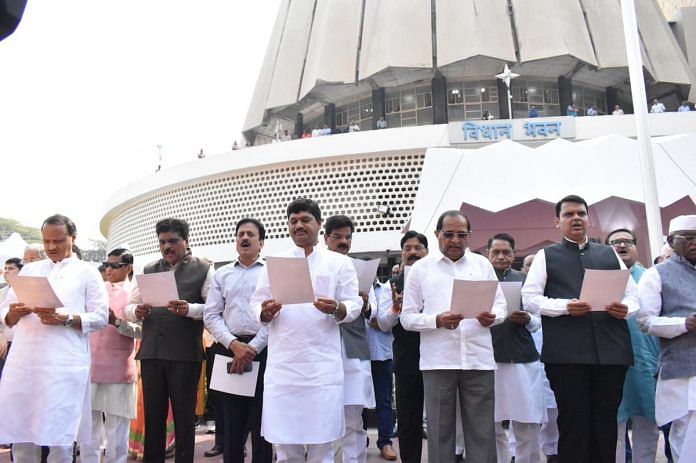Govt fails to provide Marathi translation of governor’s speech, drops a ‘significant’ stanza from the recital of a poem. Shiv Sena sides with opposition.
Mumbai: Ahead of the 2019 polls, opposition parties in Maharashtra are targeting the Bharatiya Janata Party (BJP)-led government for what they claim is neglecting the Marathi language, and even accuse it of having a pro-Gujarat approach, in a state that has historically had deep fissures between its Gujarati and Marathi communities.
Over the first two days of the budget session of the Maharashtra legislature, Congress and Nationalist Congress Party (NCP) legislators lashed out at the ruling party over its neglect of the Marathi language. The Shiv Sena, the BJP’s warring ally, also joined the opposition in the criticism.
Successive attacks
On the first day of the session, Monday, opposition legislators criticised the government for the unavailability of the Marathi translation of Governor Ch. Vidyasagar Rao’s address to the legislature. Some alleged they could hear a translation in Gujarati instead, although state education minister Vinod Tawde, also in charge of the Marathi language department, dismissed these allegations. Chief Minister Devendra Fadnavis apologised to the house for the lack of a Marathi version of the governor’s speech.
On the second day, celebrated as ‘Marathi Bhasha Din’, Congress and NCP leaders frowned at how the last stanza of a Suresh Bhat poem on the Marathi language was missing from the state government’s recital of the song presented in the Vidhan Bhavan premises.
NCP MLA Jayant Patil said: “The last stanza that the state government did not include today is very significant from the point of view of the stand that this government and the Shiv Sena takes.”
He recited the stanza, which highlights the outside influences on the language and how Marathi suffers in its own home. “It describes the condition of Marathi in the state today,” he added.
Anti-Marathi sentiment under Modi & Shah
State Congress spokesperson Sachin Sawant said: “What we are saying is that the BJP in Maharashtra is more anti-Marathi under the Narendra Modi-Amit Shah leadership. All industries are going to Gujarat. The International Financial Services Centre has been sanctioned in Gujarat, not in Mumbai.
“On the other hand, the state government has shut down hundreds of Marathi medium schools across the state, and there is no active effort to get a classical language status for Marathi.”
Recently, NCP chief Sharad Pawar had also given heft to the issue by criticising the BJP-led government’s plan of a Mumbai-Ahmedabad bullet train. Speaking to Maharashtra Navnirman Sena chief Raj Thackeray in a public interview, Pawar said: “Nobody is going to go to Ahmedabad from Mumbai. More people will come to Mumbai and the city will get more crowded.”
Responding to the criticism and allegations, BJP’s Madhu Chavan said the Congress and NCP were depressed due to the lack of power, and were thus harping on such issues instead of talking about development and constructive criticism.
“What happened during the governor’s speech was a technical glitch, and had nothing to do with disrespecting Marathi. Moreover, when the BJP is keen on retaining power in Maharashtra, how can we do that by being against Marathi sensibilities? It’s basic logic,” Chavan said.
Political calculations
A senior Congress leader who did not wish to be named said the larger strategy is to consolidate Marathi votes that otherwise go to the BJP. “The Gujarati voters in Maharashtra will not isolate the BJP politically while Shah and Modi are around. So our attempt is to attract the BJP’s Marathi vote base before the Shiv Sena starts doing so.
“Politically, we also want to disturb the Shiv Sena by being the first and most vocal to raise the issue of disrespect to the Marathi language in the legislature, and instigate the party to join our chorus and speak out against the government,” he said.
In an editorial in Saamana, the Shiv Sena’s mouthpiece publication, the party condemned the lack of a Marathi translation of the governor’s speech, saying “it is a fine example of how the administration has slipped and is running into neglect”.
It said: “The Shiv Sena is trying hard to preserve Marathi in Mumbai. But to win assembly and civic elections, BJP and all other political parties try to create a divide between Marathi and non-Marathi votes.”
The party personally targeted Fadnavis for projecting himself as a ‘leader for all languages’.
Mumbai-based political analyst Surendra Jondhale said opposition parties have smartly tried to steal the issue, and are now trying to portray the BJP as not being a genuine protector of Marathi, while widening the political gap between the BJP and Shiv Sena.
“The opposition parties are trying to show people that this government talks about Marathi pride, culture and identity, but is not very serious about it,” Jondhale said.
The Marathi-Gujarati divide
The relationship between the Marathi and Gujarati communities in Maharashtra has historically been uneasy and has its roots in the Samyukta Maharashtra movement of the 1960s, when Gujarat and Maharashtra were carved out of the Bombay Presidency.
It was also the decade when Bal Thackeray, who would lampoon rich Gujarati and Marwari industrialists and traders in his cartoons in the weekly Marmik, launched the Shiv Sena.
In its fight for the sons of the soil, the Shiv Sena often criticised the Gujarati community, blaming it for injustice to the Marathi population in its own home state, while the BJP traditionally drew its support in Mumbai from the Gujaratis.
The two allies, who contested the 2014 assembly elections independently, pitted the Marathi and Gujarati communities against each other.



